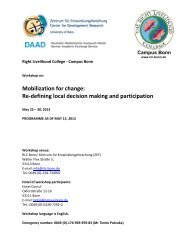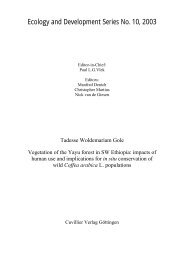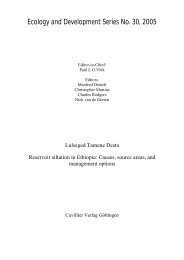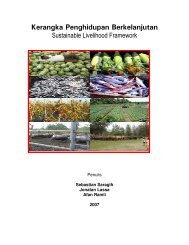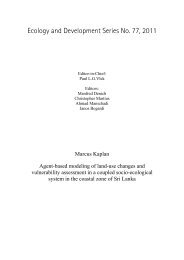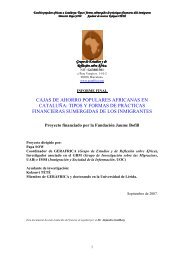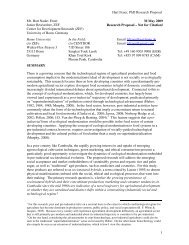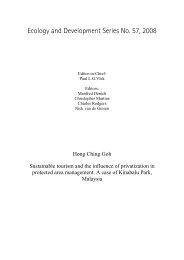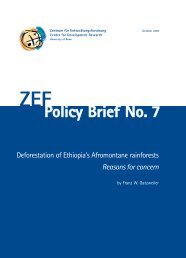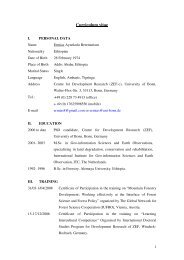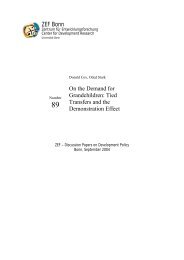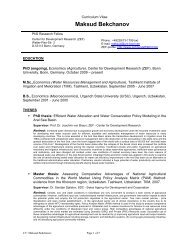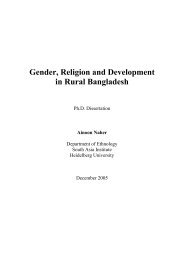ZEF Bonn
ZEF Bonn
ZEF Bonn
Create successful ePaper yourself
Turn your PDF publications into a flip-book with our unique Google optimized e-Paper software.
68<br />
<strong>ZEF</strong> <strong>Bonn</strong> ● Center for Development Research – Annual Report 2001/2002<br />
"<strong>ZEF</strong>'s core activities, which<br />
emphasise the fact that it is a<br />
research institute, correspond<br />
to those of a university institute.<br />
They include, as is impressively<br />
documented by the <strong>ZEF</strong><br />
projects, a comprehensive program<br />
of practical applicationoriented<br />
research policy and<br />
advice."<br />
<strong>ZEF</strong> Evaluation<br />
The recently completed first evaluation by an external and independent expert team<br />
has assessed <strong>ZEF</strong>'s performance and has given recommendations for further improvements.<br />
The main findings and recommendations were summarised by the Evaluation<br />
Commission, consisting of<br />
Prof. em. Dr. Dr. h.c. Dieter Oberndörfer, Arnold Bergstraesser Institute, Freiburg i.<br />
Br. (Chair),<br />
Dr. Ulrich Hiemenz, Director OECD Development Centre/Paris,<br />
Prof. Dr. Franz Nuscheler, Institute for Development and Peace /University of<br />
Duisburg, and<br />
Prof.em. Dr. Paul Streeten, Spencertown, New York/USA<br />
The report is available in German only (http://www.zef.de). The following translation<br />
of the conclusions section of the evaluation report is provided by <strong>ZEF</strong> below.<br />
Main Findings and Recommendations<br />
I. Appropriateness of the Mission, Strategy and Priorities<br />
<strong>ZEF</strong>'s mandate is defined in the foundation concept of the Senate of the University<br />
of <strong>Bonn</strong>. It calls for development-related basic research and application-oriented<br />
research on concrete development issues for providing advice to practitioners and<br />
policy-makers.<br />
In the 'Strategy for the Future', a strategy paper developed in 2000 by the directors<br />
and staff in collaboration with the <strong>ZEF</strong> International Advisory Board, the specifications<br />
of the Senate's concept concerning research, teaching activities and knowledge<br />
transfer are put into concrete terms.<br />
<strong>ZEF</strong>'s activities address pivotal issues of topical interest in international development<br />
policy and development research. All topics currently being worked on are relevant<br />
for development research. On the one hand, new fields of research are being built<br />
up that anticipate future developments, such as the question of the potentials of<br />
new technologies for poor populations (biotechnology, information technology). On<br />
the other hand, research is being conducted in already established fields. In this way,<br />
<strong>ZEF</strong> demonstrates competence in “classical" fields of research together with innovative<br />
potential, thus being able to establish itself in new research fields.<br />
<strong>ZEF</strong> strives successfully to develop new fields of research with minimal duplication<br />
and justifiable initial investments. Research issues that are the principal domains of<br />
other research facilities or, as is the case with education research, issues that require<br />
large initial investments were not included in <strong>ZEF</strong>'s future research agenda owing to<br />
the Center's limited human and financial resources.<br />
<strong>ZEF</strong>'s core activities, which emphasise the fact that it is a research institute, corre-



